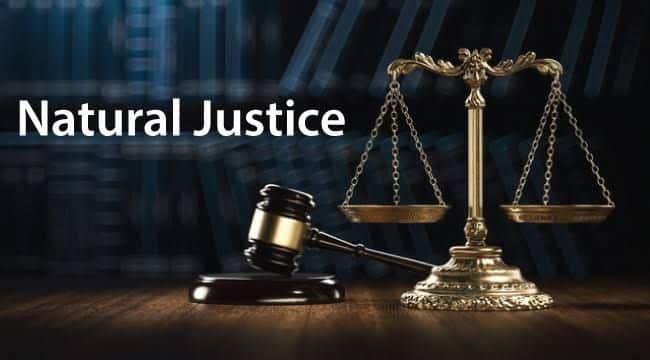
DOCTRINE OF NEMO JUDEX IN CAUSA SUA
The common law concept of natural justice refers to higher procedural requirements that the courts have established and that all judicial, quasi-judicial, and administrative authorities have to follow when making decisions that adversely affect the rights of private individuals. Natural justice is the foundation for equity, fairness, and equality.
In a welfare state like India, the role and power of administrative agencies are growing rapidly. The whole concept of the Rule of Law will be rendered worthless if the State machinery is not charged with carrying out these responsibilities in a fair and reasonable manner.
Nemo judex in causa sua meaning
- As per the nemo judex in causa sua meaning, nobody has the right to assess their own case, and the panel that makes the decision ought to be impartial and free of bias.
- The rule against prejudice is another name for this theory. This ensures that the decision-maker will always have to act fairly and impartially. A person with this kind of bias is not qualified to be a judge for two reasons:
- Justice is not only required, but it is also seen as something that should be applied;
- Nobody should be able to hold a judicial position by themselves. When circumstances in front of an official are skewed or suit a different purpose, decision-making processes can become tainted.
- Nemo judex in causa sua meaning example:A is a judge and ‘B’s father in the district court where ‘A’ is accused of murder. It’s crucial to keep in mind that ‘A’ is ineligible to hear this case because his own son is the one being accused and bias will undoubtedly creep in.
nemo judex in causa sua case law
- In the nemo judex in causa sua case law of Yunus Khan v State of Uttar Pradesh &ors, since the accused party is the judge, has a fiduciary relationship with the adjudicator, or is otherwise likely to contribute to bias in the adjudication process, it was determined that the nemo judex in causa sua doctrine ought to be upheld and that a judgment or order made in such a case would not be enforceable.
- In the nemo judex in causa sua case law ofSri K. Vijaya Bhaskar Reddy v Govt of Andhra Pradesh &ors.,it was mentioned that the ideas of justice and equity depend heavily on the prohibition against bias. A judge is not permitted to resolve any case in which he may be biased or in which he may fairly be suspected of being biased, according to the ruling. This regulation should supersede any parliamentary act because it is so important.
nemo judex in causa sua: Exceptions to the Doctrine
- In Statutory Exceptions: This special exception recognizes that the legislature may have good cause to waive the natural justice norm in certain situations, such as expediting the decision-making process or accomplishing a particular policy objective. However, even in cases when the legislature has eliminated the crucial necessity of natural justice, the decision-maker still needs to act justly and reasonably and consider all relevant factors before making a judgment.
- In Emergencies: To allow for quick action in an emergency or to protect national security, the principles of natural justice may be modified or suspended. To allow the government to function smoothly, the right to be heard in emergencies is currently excluded by law. This implies that no hearing or process that jeopardizes the interests of the public at large could be subject to the application of natural justice standards.
- In Exception of Waiver: This exception recognizes that there may be good reasons for parties to renounce their right to natural justice, such as a necessity to proceed swiftly in order to avoid needless delays or to negotiate a settlement. It is important to keep in mind that the waiver must be voluntary and informed. One cannot be said to have given up their claim to natural justice if they were coerced or tricked into doing so.
The right to equality is infringed upon when the natural justice doctrine “nemo judex in causa sua” is breached. Every country in the world, including India, has a system of law that oversees the administration of justice and has an impact on people’s daily lives.
The principles of natural justice refer to the fundamental procedural rights that both judicial and administrative authorities must respect when making decisions that affect people’s rights and interests. They serve to ensure impartiality and justice in the procedures that result in decisions and are an essential component of the rule of law.
To enable everyone involved to understand the rationale behind the decision, the process must also be transparent and easy to understand. The decision-makers must be unbiased and independent in order to ensure that decisions are made free from bias or outside influence.
For any latest news, legal topics, judiciary exams notifications, patterns, etc watch Jyoti Judiciary’s YouTube channel for legal videos for any updates at https://youtube.com/@jyotijudiciarycoaching4852?si=2cwubh9d2A9urwJf


